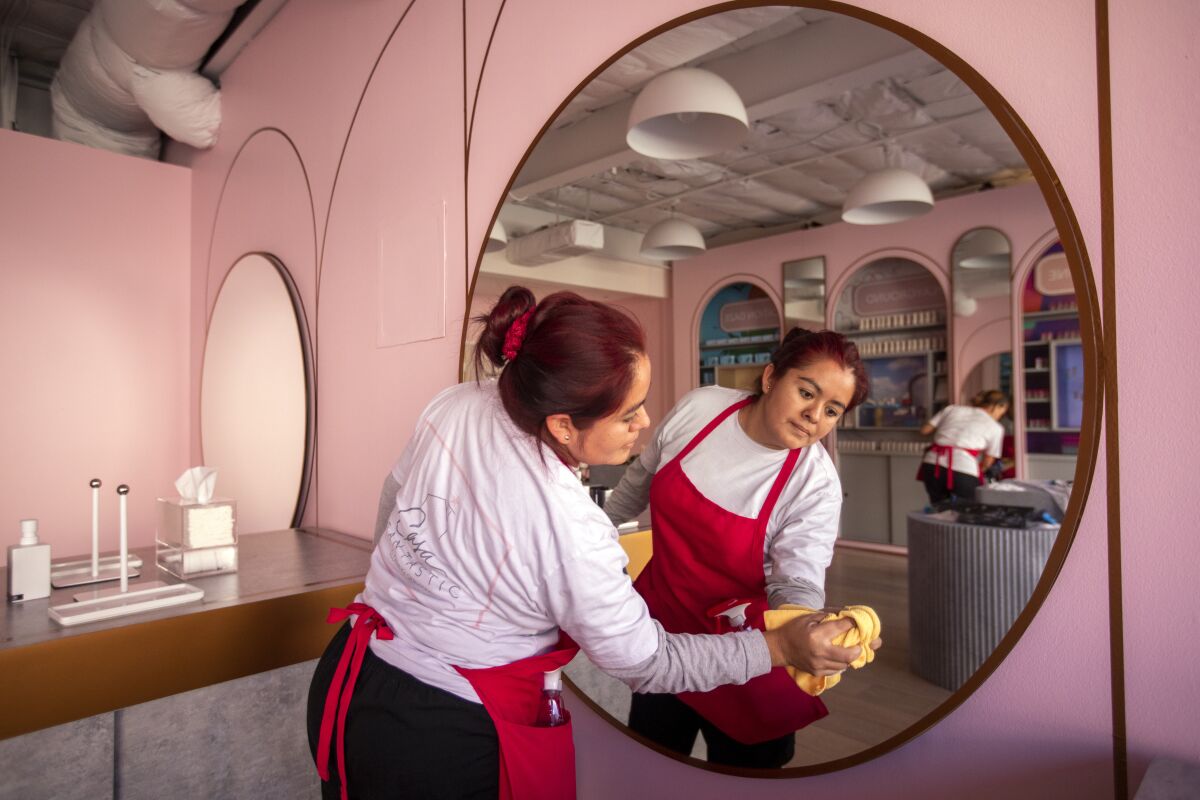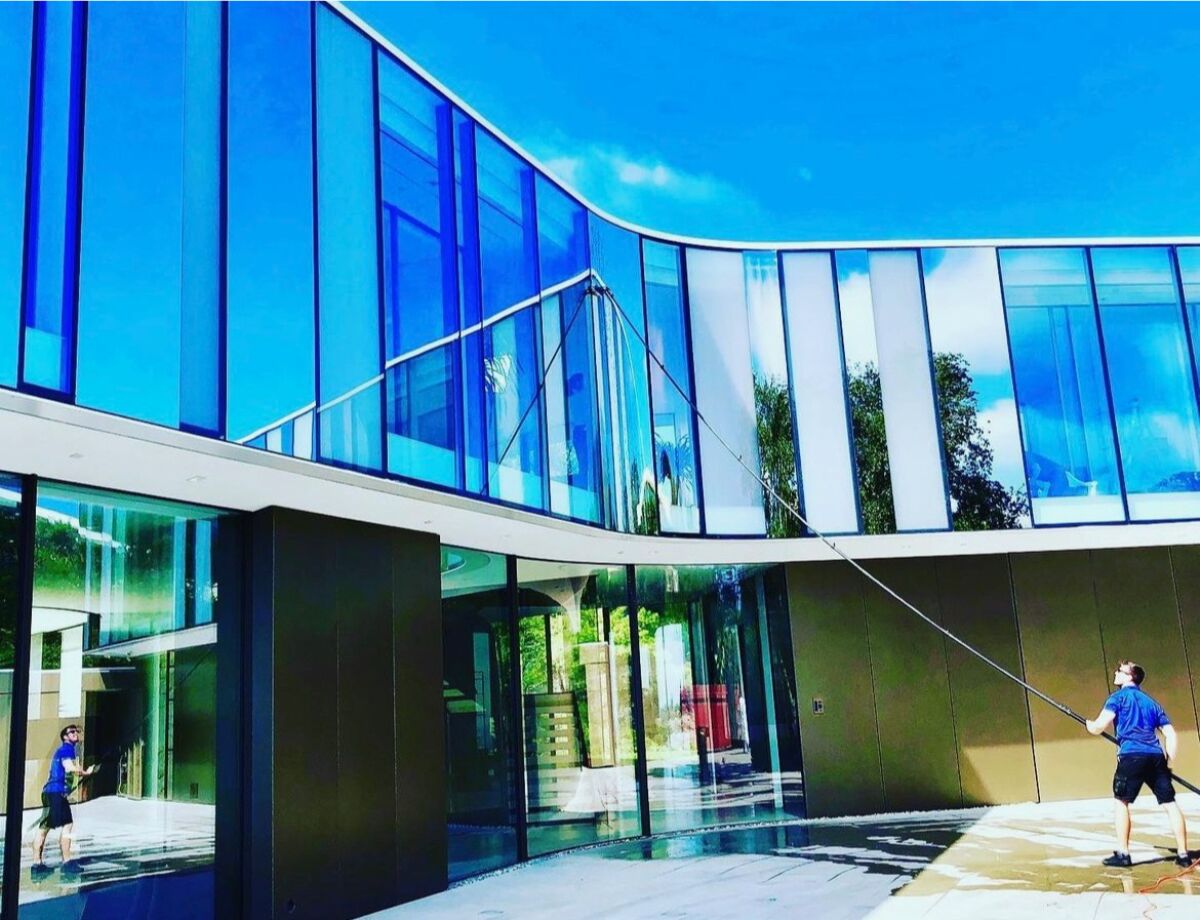In Southern California, a mansion is a micro-economy.
Every luxury property has a developer who envisioned it, an architect who built it, an agent who sold it, and a deep-pocketed buyer who had to have it.
To run the place — to have the guests greeted, drinks poured, floors polished, windows washed, cupboards stocked, the perimeter secured, meals cooked, children curated, lawns manicured, ponds algaecided — typically requires a staff akin to a modern-day Downton Abbey.
And whenever these prized properties surface for sale, many dozen more workers enter the fray — tasked with elevating the home to its most beautiful state, keeping it in pristine condition in hopes of luring a buyer willing to spend a fortune to acquire it.
They include maids, gardeners, handymen, pool techs, interior designers, limestone specialists and aquarium cleaners. They work behind the scenes, sweating through hot summers to ensure that every crack is cleaned, every leaf is trimmed and every pool has the perfect PH balance.
In the end, the developer gets the profits, the agent gets the TV show, and the rich person gets the house. But these workers —critical cogs in Southern California’s rarefied lifestyles and its extraordinary real estate market—make it all happen.
“I take pride because I’m a part of the project,” said Deisy Flores, a maid and owner of Casa Fantastic Cleaning Services. “The architect, the contractor, the stagers, and us. We’re a part of it.”

Deisy Flores, owner of Casa Fantastic Cleaning Services, says, “I take pride because I’m a part of the project.”
(Francine Orr/Los Angeles Times)
Flores founded the company with the help of her mother in 2013, and the work has evolved from cleaning modest homes in West Covina to scouring mega-mansions on the Westside. She employs 15 professional cleaning technicians — she prefers that term over maids, which feels restrictive since the company handles commercial projects as well. While smaller projects need only one or two people, larger ones require the entire squad.
On hectic days such as these, Flores oversees it all like a quarterback executing a well-oiled offense. She communicates with the homeowner and dispatches teams across the house, assigning any number of ladders, sponges and buckets to help complete the task. Certain towels are used for delicate surfaces such as marble or glass chandeliers. Backpack vacuums often make a cameo, since wheeled ones might scratch the floor.
Her team takes on any job, from small homes that take a few hours to hillside castles that take days. Often, they’re not the only ones there.
“We’re always working around people: contractors, floor polishers, furniture movers, stagers, people installing appliances. There’s lots of traffic,” she said.
It’s hard labor — so much so that Flores doesn’t let her team work more than eight hours at a time. But at the top of the market, the cleaning contracts are lucrative.
Her crew is currently cleaning a 20,000-square-foot mansion in Bel-Air that hit the market two months ago. The agent has been scheduling showings every week and weekend, so Flores’ team has been tidying up the place three times a week since it first listed for sale.
The current tab is $17,000 and climbing with each visit.

Erika Mijangos cleans a mirror at a commercial business.
(Francine Orr/Los Angeles Times)
For the owner, those bills can add up quickly, especially when a property sits on the market for months or even years. Southern California is one of the few markets in the country that regularly sees listings of $100 million or more, and with properties of such caliber, there may be only a few dozen potential buyers in the world with the means. If one of those buyers doesn’t come along, owners could spend millions just trying to keep the place in salable shape.
In April, former Disney chief Michael Eisner offered up his Malibu compound for $225 million but hasn’t yet found a buyer. The Manor, a famous 123-room Holmby Hills mansion once owned by Aaron and Candy Spelling and featured rooms dedicated to gift wrapping and flower cutting, hit the market in February for $165 million. No takers. In Beverly Crest, a $100-million mansion has been listed since January 2021. Crickets.
To show off such luxurious estates, some sellers will hire marketing teams to throw wild parties at the homes with other agents and potential buyers on the guest list. These events require that caterers, cooks, entertainers and influencers are added to the staff — and like most jobs in the service industry, the work sometimes evolves beyond the original description.
One such event for a luxury condo complex in Pasadena featured a dozen young women in gold dresses to serve champagne. Toward the end of the night, the hosts brought everyone outside and handed out small envelopes filled with butterflies. When opened, they were supposed to fly away over a fountain, showcasing the beauty of the property and the potential for new life there.
A “butterfly release” is sometimes integrated into weddings and funerals, signifying hope for the future or the perpetuation of life. Only this time, most of the butterflies had died inside the envelopes by the time the guests opened them — and the few that survived ended up nosediving into the fountain.
For the next half hour, the women in gold dresses were tasked with opening the remaining envelopes in search of survivors and burying the rest by hand in shallow, makeshift graves in the garden outside the building. In a complex as luxurious as this, the soil was nicely coiffed, soft enough for even the most refined fingers. No brick-hard Southern California clay.
Everything’s bigger with a mega-mansion: not only the cost, but the cost of selling it.
Kevin Stein is a district supervisor with L.A. Elite Window Cleaning, which cleans the windows of roughly 1,000 houses every year. Stein and his team often work for luxury clients — most notably agents for The One, the 105,000-square-foot behemoth that traded hands for $141 million earlier this year. While small apartment jobs can cost just $250, glass-loaded mansions such as The One can cost roughly $10,000 to clean.

The One, a Bel-Air mega-mansion, required a team of maids, security guards and pool cleaners when it was on the market.
(Marc Angeles)
“I’m numb to it now, but seeing the opulence and insane wealth we’re surrounded by in this city is crazy,” Stein said. “It’s always shocking the upkeep and staffing required to clean these places.”
Armed with either a squeegee and mop or a water-fed pole — a 60-foot-long device that uses deionized water to clean glass spot-free — Stein keeps properties looking glistening. It’s a less common service than maids, but he said he’ll typically service a home twice a year (save for those in coastal communities like Malibu and Laguna Beach where ocean air forces owners to seek his services every other week).
“I work on homes that are on the market all the time,” he said. “Realtors always want the windows clean for potential buyers, and they also want them clean when they photograph the home.”
Like Flores, he’s one of dozens of workers at a home on any given day.
“You go to properties that have 30-40 landscapers tending to gardens that look like Buckingham Palace,” he said, adding that the biggest properties have a pecking order. The homeowner, then the homeowner’s assistant, then the estate manager, then the estate manager’s assistant — not to mention the internal hierarchies among the maids, landscapers and other service staffs.
“There’s a full hotel staff at some of these places,” he said.

A cleaner for L.A. Elite Window Cleaning washes the exterior of a Bel-Air home.
(L.A. Elite Window Cleaner)
And that’s just when the house is on the market. When it becomes occupied, different—or additional— workers fill the halls: nannies, chefs and butlers. Someone to service the bowling alley. Someone to refill the candy room with sweets.
Some compounds require so many bodies that they come with “staff quarters,” or guesthouses jammed full of rooms where full-time workers can stay. Beneath the glitz and glamour of The One, there’s an entire level of bedrooms for staff — with a decidedly lower level of luxury than the rest of the estate.
Steve Sheftel works at these types of homes all the time. As the founder of Beverly West Pool Co., he and his two employees service 170 pools per week, handling everything from repairs to upgrades to general maintenance.
He deals in every type of pool: kidney-shaped installations behind a bungalow and extravagant oases with grottos and fountains in the hills. Needless to say, those require a bit more work.
“With hillside pools, you can double or triple your costs because of all the footings and beams. There’s a lot more engineering required,” said Sheftel, who’s been servicing pools for 45 years.
He’s not a huge fan of the infinity pools that most developers insist on adding these days. Water cascading over the edge makes for a lovely scene, but behind the facade is a complicated system of catch basins, water-level controllers, filters and pumps. They’re attractive in theory and en vogue at the moment, but if not properly constructed, constant repairs will cost owners a small fortune.
Take the aforementioned One, which takes the concept of the residential swimming pool and lets it mutate into something akin to a planned community : the property features five of them, including a pool out back, a pool inside, a floating pool that’s perched outside the second-story bedroom and a moat-like pool outside the nightclub complete with lounges and fire pits.
They look immaculate from afar, but a closer look shows that some have foundations that are already cracking. When the estate was still on the market, three or four pool guys would come service them every single week, according to Ted Lanes, who served as the property’s court-appointed receiver last year.
The pool staff was one team among many. Even though the house was unoccupied, service staff included a full-time handyman, two security guards that patrolled the property 24/7 and three or four housekeepers who cleaned once a week.
For these services, the monthly bill was roughly $40,000.
Jason Oppenheim, star of Netflix’s “Selling Sunset,” is currently listing a 20,000-square-foot mansion in Hollywood Hills for $40 million. He broke down the monthly expenses to keep the place looking pristine.

This three-story mansion listed by Jason Oppenheim racks up a $40,000 monthly bill to keep it pristine while it’s on the market.
(The Oppenheim Group)
Full-time property manager: $8,000 a month.
General maintenance: $10,000 a month.
Staging: $5,000 a month.
Artwork: $2,500 a month.
Cleaners: $3,500 a month.
Pool guys for the 175-foot-long pool that overlooks the city and cascades into an atrium garden: $1,500 a month.
Gardeners (not only for the landscaping, but also for the “living wall” of greenery along the driveway): $2,500 a month.
Specialists who treat the wood and clean the 20,000 square feet of limestone featured across the property: $7,000 a month.
Total cost: $40,000. And that’s not including the mortgage, property tax, insurance and utilities for a home that the seller isn’t even occupying, which brings the monthly cost to well over $100,000.
“Some sellers try to save money when preparing to list a house. They don’t get curated artwork, don’t make any upgrades and leave their own furniture instead of paying for staging,” he said. “They might save $50,000 up front, but then lose $250,000 on the sale price.”
